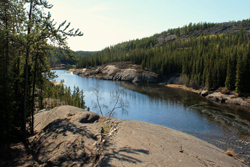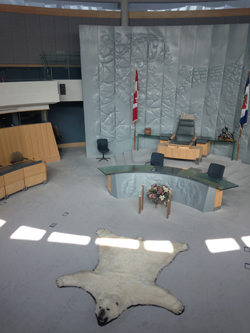
Can Canada's North Transform Its Mineral Wealth Into Well-Being?
Part II in a two-part series on the challenges of natural resource governance in Canada's North.
At its peak, the tiny South Pacific island nation of Nauru was the world's second richest per capita. From the mid-1970s to the early 1990s, Nauruans lived extravagantly thanks to phosphate production and a population of less than 15,000. One well-known story tells of a chief of police who bought a yellow Lamborghini to drive on Nauru's only paved road, only to find himself too chubby to fit behind the wheel. Others tell of weekend shopping trips to Hawaii and an investment in a London East End musical.

Northern Canada, a vast landscape abundant in diamonds, gold, silver, copper, zinc, rare earth minerals, oil and natural gas (Photo: Andrew Bauer)
Today, Nauru is one of the world's poorest countries, just as it was before mining began.
Canada's Northwest Territories (NWT) is trying to avoid these mistakes and others, as it grapples with how to manage its anticipated oil, gas and mineral windfall revenues. Already the richest province or territory in the country with an annual GDP of $107,000 per capita, over the coming decades this northern wilderness of 43,000 people may experience a natural resource boom that rivals Abu Dhabi.
Preparing for giant windfalls
Mineral production is expected to expand steadily, though not spectacularly, doubling GDP in the next decade. But oil and natural gas could be transformative. The Mackenzie Delta-Beaufort Sea has the potential to be a prolific producer of conventional natural gas and light oil, the major extractive companies continue to explore throughout Northern Canada, and the Canol oil shale could have up to 3 billion barrels of recoverable oil, more than Colombia or Uganda. [See Part I of this blog post for resource revenue projections in the Northwest Territories.]

The Northwest Territories Legislative Building in Yellowknife, the capital (Photo: Andrew Bauer)
Heeding Nauru's lesson that it is better to invest resource revenues rather than consume them, and the NWT's own history of mineral booms and busts, in 2012 the legislature established the NWT Heritage Fund “to ensure that future generations of people of the Northwest Territories benefit from on-going economic development, including the development of non-renewable resources.” The fund is expected to save approximately 25 percent of mineral revenues based on a non-binding agreement between the government and legislators. As of September 2013, it held just over $500,000, but it will grow quickly.
Unfortunately, neither the purpose of the fund nor most of the rules governing it have been spelled out. Evidence suggests that a lack of appropriate rules and lack of broad-based consensus on the rules often leads to fund mismanagement and, in extreme cases like in Libya, conflict over resource revenues. For instance, the Kuwait Investment Authority's lost $5 billion in oil revenue in the 1980s and 90s. And the Russian government plundered nearly $10 billion from the National Wealth Fund, essentially an oil-financed public pension fund, from 2009 to 2013. In both cases, the rules were designed by a select few and the funds were not adequately supervised.
Consensus government in action
A team from Action Canada, a leadership development and public policy program for young Canadian professionals, has been advocating for clearer rules, greater fund transparency and stronger oversight to address these gaps. The worry is that, if the right rules and oversight mechanisms are not in place by the time enormous revenues start flowing, the temptation to raid the fund or use it for political patronage may be too great.
Their report – the product of consultations with elected leaders, government officials, aboriginal government and community leaders, and natural resource governance experts – drew the attention of the NWT Legislative Assembly. Last month, the Legislative Assembly's Committee on Priorities and Planning invited the team and the Natural Resource Governance Institute (NRGI) to present on good fund governance in the capital, Yellowknife.
Legislators exchanged ideas on the Heritage Fund's objectives, its investment strategy, and a proposed Supervisory Council to manage the fund. For instance, while some felt that a significant portion of mineral revenues should be stored away in safe foreign assets for the benefit of future generations, others stressed the need for immediate investments in the NWT.
Despite its high income and vast underground wealth, the territory suffers from high cost of living and is the Canadian region with the greatest needs for housing, quality education and mental health services. Only 56 percent of students graduate from high school; a mere 37 percent in the mainly aboriginal smaller communities. Life expectancy is five years less than the Canadian average.
The Action Canada team and NRGI agreed that resource revenues should be used primarily to improve the standard of living of NWT citizens, through investments in health, education and infrastructure. The budget already provides a well audited, transparent process to make these types of investments in the local economy. The Heritage Fund, however, is a different type of financial vehicle, one whose goal might be to save for future generations, grow a pool of precautionary savings, earmark resource revenues for specific development projects, or smooth spending of resource revenues over the long-term. As such, it ought to invest in financial assets outside the territory. This would increase financial returns at lower overall risk, until a time when it is deemed appropriate to transfer either the interest or the principal into the budget to be spent locally.
While the main issues are yet to be resolved, work continues to fill in the regulatory gaps and build greater consensus on the rules. In the NWT, there is some consensus that comprehensive fund transparency, strong accountability mechanisms and appropriate rules are essential for transforming natural resource wealth into well-being. Whether this recognition gets transformed into action remains to be seen, but the government of the NWT is headed in the right direction.
Andrew Bauer is an economic analyst at NRGI. In his previous blog post he looked at how much resource revenue will actually accrue to the government of the Northwest Territories.
